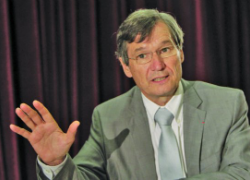Francois Roux has been an attorney for 38 years. In that time, he has represented defendants before various international criminal jurisdictions such as the International Criminal Tribunal for Rwanda and the International Criminal Court. His previous defendants include the Cambodian genocide leader Comrade Duch and 9/11 conspirator Zacarias Moussaoui. Mr. Roux recently joined the Special Tribunal for Lebanon as the Head of Defence Office.
I sat down to lunch with Francois Roux. Francois was defense attorney for surviving 9/11 conspirator Zacarias Moussaoui. He shared his thoughts on the role of Defense lawyers.

Let’s first clarify the role of Defense lawyers. People often ask: how can anyone defend murders and rapists? What if you know they are guilty? Well, the role of defense lawyers is not to paint the guilty as innocent, but rather to perpetuate “fairness”. After all, the factual and legal principles used to convict any individual will dictate future practices of our justice system. While this specific individual may be clearly guilty, the rationale used to convict him may be used on an innocent person as well.
Thus, it is the job of Defense lawyers to bolster legal principals protecting citizens from abusive police procedures, and encourage a truly “fair” process for all. Justice must be blind, even to the most heinous of crimes. Even Iran has laws regarding human rights and a fair trial. But what separates tyranny from democracy is respect for the process. Defense attorneys are guardians of this process.
Most law students are aware of the rationale above. But Francois Roux defends a different type of criminal. His clients are accused of crimes such as genocide and terrorism. Men like Moussaoui still boast of their own actions. They do not belong to a member of the “public”, but are often military leaders, heads of state. Defending them is irrelevant to creating a fairer process for the public. Yet through our conversation, Francois convinces me of the necessity of his work.
“You know, the Prosecutor has advantages. He has more resources than we do, and he’s had more time with the case. But we have something he doesn’t. He may know the case, but we know the case, and the man.” I came to a realization. In a world where everyone is convinced men like Moussaoui are the devil, Francois is one of the few still standing beside the accused. Unjudging, empathetic and resolute. Francois does so knowing he will not be appreciated by the masses, and may not even be by his own client, but he mounts his defense with zeal. This is both brave and noble, and represents some of the most redeeming qualities in humanity.
“Remember, a man must never be reduced to his crimes. He is more than that.” Francois is motivated by the potential for redemption. This redemption is not just for the accused, but for society at large. In reducing the man to his crime, we paint the world black and white. There is no mercy, no rule of law, and we strike him down with a judgment amounting to blind vengeance. But, there is a difference between vengeance and justice. There can only be redemption through justice.
And what is justice? “A just punishment is a punishment the accused is willing to accept. Only then can there be redemption.” If Francois can obtain a “just” sentence for his client, he will have obtained the elusive consensus between the victims and perpetrators. Only if the perpetrators recognize their wrongs can the long process to potential reconciliation begin. As the defense lawyer, he is one who tunes our moral compass as “civilized” peoples.
It takes courage to be the lone shepherd of the condemned, to wrangle a struggling soul from the darkest fringes of society, through the storm of condemnation and into the sliver of light that may or may not be there. It reminds me of an important lesson I learned in law school. American Lawyers are granted the title ‘Esquire’ once they pass the bar. The word traces back to medieval Europe, when it meant “shield bearer”. My Criminal Procedure professor posed this question as a parting word: “who will you choose to protect?”
William Xu is a rising 3L at American University, Washington College of Law.

